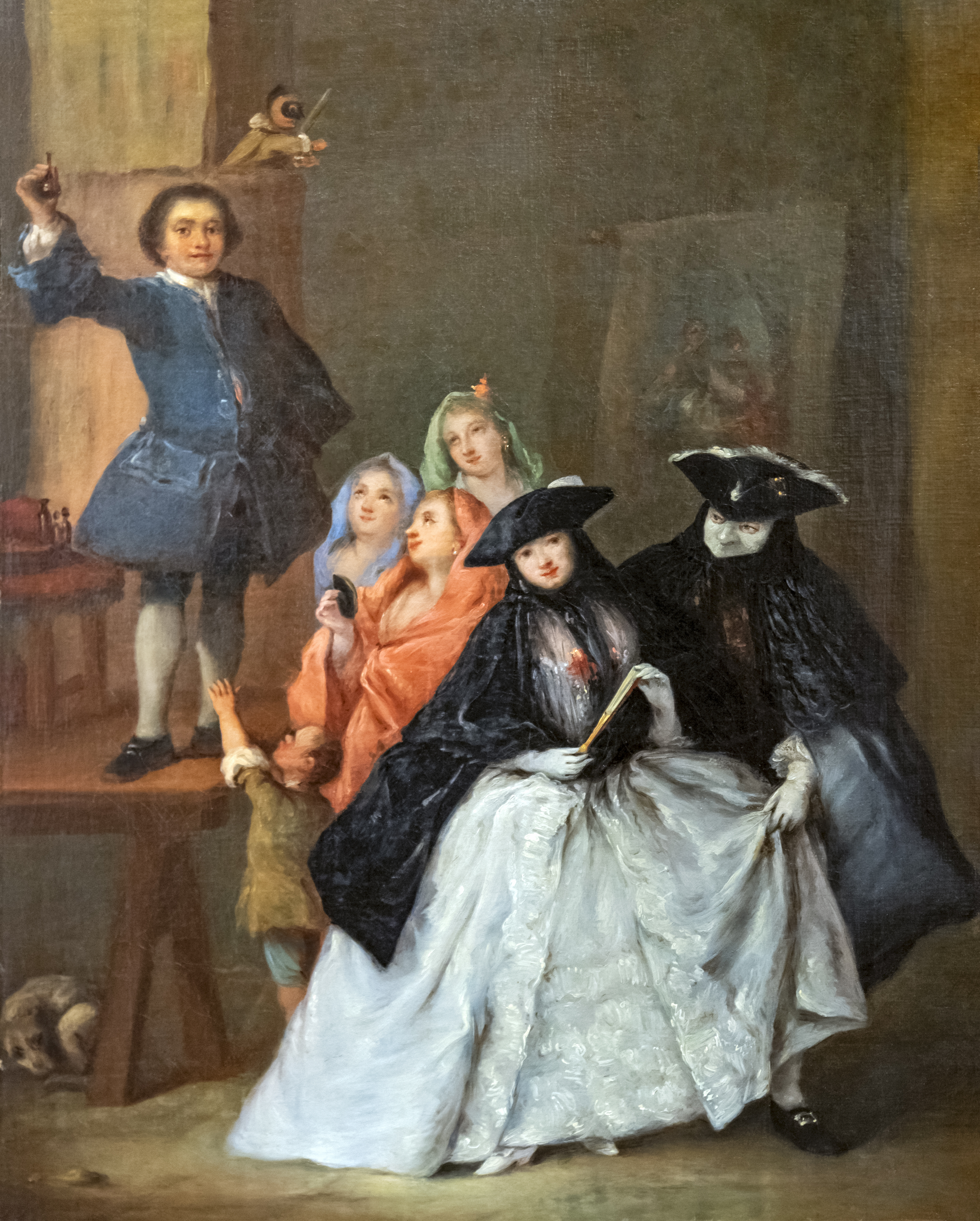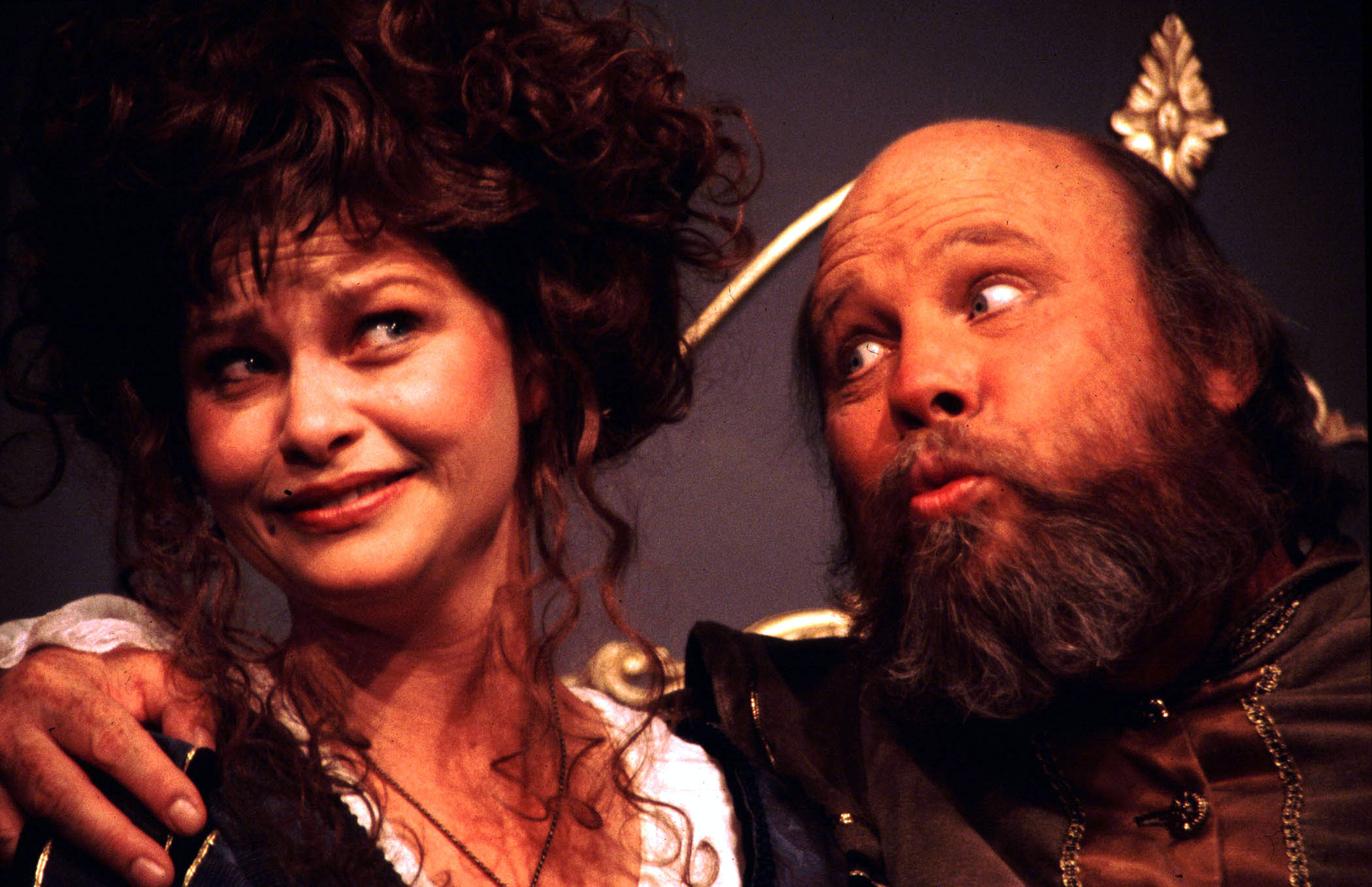|
Tabarin
Tabarin was the street name of Anthoine Girard (c. 1584 – August 16, 1633), the most famous Parisian street charlatan of his day, who amused his audiences in the Place Dauphine by farcical dialogue with his brother Philippe (as Mondor), with whom he reaped a golden harvest by the sale of quack medicines for several years after 1618. Street theatre was popular theatre, on an improvised stage with a curtain backdrop, to the music of a hurdy-gurdy and a set of viols. More formal contemporary performances were confined to the royal court or to the Hotel de Bourgogne, overseen by the medieval guild that had the monopoly of theatrical performances in Paris. A contemporary woodcut shows Tabarin in the dress of a clown, but with a gallant moustache and pointed beard, carrying a wooden sword, like his distant puppet descendant Mr. Punch, — which would trip him up— and wearing a soft grey felt hat capable of assuming countless amusing shapes in his deft fingers. ''Tabar ... [...More Info...] [...Related Items...] OR: [Wikipedia] [Google] [Baidu] |
Chapeaugraphy
Chapeaugraphy, occasionally anglicisation, anglicised to chapography, is a novelty act and a busking trick in which a ring-shaped piece of felt is manipulated to look like various types of hats. It would often be performed as a Quick-change (performance), quick-change act. The act originated in 1618 with Parisian busking, street performer Tabarin, the most famous of the charlatans who combined a French version of ''commedia dell'arte'' with a quack medicine show. He described his felt hat as "true raw material, indifferent to all forms". In the 1870s another French comedian, , revived the act and managed 15 hat-twisting styles in his act. The act was first performed in England by the French magician Félicien Trewey, who performed a tribute act titled "Tabarin, or Twenty-Five Heads under One Hat". An 1899 magazine recounts "one or two smart English performers" of that time, including Alfred Leslie. Although rarely seen today, it was featured in an episode of ''Saturday Night Liv ... [...More Info...] [...Related Items...] OR: [Wikipedia] [Google] [Baidu] |
Charlatan
A charlatan (also called a swindler or mountebank) is a person practicing quackery or a similar confidence trick in order to obtain money, power, fame, or other advantages through pretense or deception. One example of a charlatan appears in the ''Canterbury Tales'' story " The Pardoner's Tale," with the Pardoner who tricks sinners into buying fake religious relics. Synonyms for ''charlatan'' include '' shyster'', ''quack'', or ''faker''. ''Quack'' is a reference to ''quackery'' or the practice of dubious medicine, including the sale of snake oil, or a person who does not have medical training who purports to provide medical services. Etymology The English word comes from French '','' a seller of medicines who might advertise his presence with music and an outdoor stage show. The best known of the Parisian charlatans was Tabarin, whose skits and farces – which were influenced by ''commedia dell'arte'' – inspired the 17th century playwright Molière. The word is also simil ... [...More Info...] [...Related Items...] OR: [Wikipedia] [Google] [Baidu] |
Falstaff
Sir John Falstaff is a fictional character who appears in three plays by William Shakespeare and is eulogised in a fourth. His significance as a fully developed character is primarily formed in the plays ''Henry IV, Part 1'' and '' Part 2'', where he is a companion to Prince Hal, the future King Henry V of England. Falstaff is also featured as the buffoonish suitor of two married women in ''The Merry Wives of Windsor''. Though primarily a comic figure, he embodies a depth common to Shakespeare's major characters. A fat, vain, and boastful knight, he spends most of his time drinking at the Boar's Head Inn with petty criminals, living on stolen or borrowed money. Falstaff leads the apparently wayward Prince Hal into trouble, and is repudiated when Hal becomes king. Falstaff has appeared in other works, including operas by Giuseppe Verdi, Ralph Vaughan Williams, and Otto Nicolai, a "symphonic study" by Edward Elgar, and in Orson Welles's 1966 film ''Chimes at Midnight''. The op ... [...More Info...] [...Related Items...] OR: [Wikipedia] [Google] [Baidu] |
Theatre Of France
An overview of the history of theatre of France. Middle Ages Discussions about the origins of non-religious theatre ("théâtre profane") — both drama and farce — in the Middle Ages remain controversial, but the idea of a continuous popular tradition stemming from Latin comedy and tragedy to the 9th century seems unlikely. Most historians place the origin of medieval drama in the church's liturgical dialogues and "tropes". At first simply dramatizations of the ritual, particularly in those rituals connected with Christmas and Easter (see ''Mystery play''), plays were eventually transferred from the monastery church to the chapter house or refectory hall and finally to the open air, and the vernacular was substituted for Latin. In the 12th century one finds the earliest extant passages in French appearing as refrains inserted into liturgical dramas in Latin, such as a Saint Nicholas (patron saint of the student clercs) play and a Saint Stephen play. Dramatic plays in French ... [...More Info...] [...Related Items...] OR: [Wikipedia] [Google] [Baidu] |
Abraham Bosse
Abraham Bosse ( – 14 February 1676) was a French artist, mainly as a printmaker in etching, but also in watercolor painting, watercolour.Maxime Préaud, "Célébrations nationales 2004, Arts: Abraham Bosse, graveur en taille-douce et théoricien de l’art français", 2004 Based on recent research, his date of birth has been corrected to 1604 from the traditionally given birth year of 1602. Bosse's apprenticeship contract was found in which it is mentioned that he was aged 16 at the date of signing the contract (16 June 1620). Life [...More Info...] [...Related Items...] OR: [Wikipedia] [Google] [Baidu] |
Paul Colin (artist)
Paul Colin (27 June 1892 – 18 June 1985) born in Nancy, France, died in Nogent-sur-Marne. Colin was a prolific master illustrator of Decorative Arts posters. Alexandre-Marie Colin (5 December 1798 – 21 November 1875) was a relative. Paul Colin was a professional artist, scenographer, graphic designer and theatre painter. He specialised in theatre sets, book design and costume design. During his lifetime he created over 1900 posters and worked in theatre for more than 40 years. He was praised for the perfect combination of organic and graphic themes with geometric forms. He was influenced by Surrealism and Cubism, typically using very exaggerated shapes, striking colours and very stylised art forms in his work. He used a large palette of colours to emphasise the energy and meaning conveyed by his subjects, and his art is strongly in the style of the Art Deco movement. Many of his most famous illustrations were created for Jazz Age music and theatre. His designs incorporate jazz ... [...More Info...] [...Related Items...] OR: [Wikipedia] [Google] [Baidu] |
Cabaret
Cabaret is a form of theatrical entertainment featuring music song, dance, recitation, or drama. The performance venue might be a pub, casino, hotel, restaurant, or nightclub with a stage for performances. The audience, often dining or drinking, does not typically dance but usually sits at tables. Performances are usually introduced by a master of ceremonies (M.C.). The entertainment, as performed by an ensemble of actors and according to its European origins, is often (but not always) oriented towards adult audiences and of a clearly underground music, underground nature. In the United States, striptease, American burlesque, burlesque, drag shows, or a solo (music), solo vocalist with a pianist, as well as the Music venue, venues which offer this entertainment, are often advertised as cabarets. Etymology The term originally came from Picard language or Walloon language words ''camberete'' or ''cambret'' for a small room (12th century). The first printed use of the word ''kaberet' ... [...More Info...] [...Related Items...] OR: [Wikipedia] [Google] [Baidu] |
Eponym
An eponym is a noun after which or for which someone or something is, or is believed to be, named. Adjectives derived from the word ''eponym'' include ''eponymous'' and ''eponymic''. Eponyms are commonly used for time periods, places, innovations, biological nomenclature, astronomical objects, works of art and media, and tribal names. Various orthographic conventions are used for eponyms. Usage of the word The term ''eponym'' functions in multiple related ways, all based on an explicit relationship between two named things. ''Eponym'' may refer to a person or, less commonly, a place or thing for which someone or something is, or is believed to be, named. ''Eponym'' may also refer to someone or something named after, or believed to be named after, a person or, less commonly, a place or thing. A person, place, or thing named after a particular person share an eponymous relationship. In this way, Elizabeth I of England is the eponym of the Elizabethan era, but the Elizabethan ... [...More Info...] [...Related Items...] OR: [Wikipedia] [Google] [Baidu] |
Voltaire
François-Marie Arouet (; 21 November 169430 May 1778), known by his ''Pen name, nom de plume'' Voltaire (, ; ), was a French Age of Enlightenment, Enlightenment writer, philosopher (''philosophe''), satirist, and historian. Famous for his wit and his criticism of Christianity (especially Criticism of the Catholic Church, of the Roman Catholic Church) and of slavery, Voltaire was an advocate of freedom of speech, freedom of religion, and separation of church and state. Voltaire was a versatile and prolific writer, producing works in almost every literary form, including Stageplay, plays, poems, novels, essays, histories, and even scientific Exposition (narrative), expositions. He wrote more than 20,000 letters and 2,000 books and pamphlets. Voltaire was one of the first authors to become renowned and commercially successful internationally. He was an outspoken advocate of civil liberties and was at constant risk from the strict censorship laws of the Catholic French monarchy. H ... [...More Info...] [...Related Items...] OR: [Wikipedia] [Google] [Baidu] |
Nicolas Boileau-Despréaux
Nicolas Boileau-Despréaux (; 1 November 1636 – 13 March 1711), often known simply as Boileau (, ), was a French poet and critic. He did much to reform the prevailing form of French poetry, in the same way that Blaise Pascal did to reform the prose. He was greatly influenced by Horace. Family and education Boileau was the fifteenth child of Gilles Boileau, a clerk in the Parlement of Paris. Two of his brothers attained some distinction: Gilles Boileau, the author of a translation of Epictetus; and Jacques Boileau, who became a canon of the Sainte-Chapelle, and made valuable contributions to church history. The surname " Despréaux" was derived from a small property at Crosne near Villeneuve-Saint-Georges. His mother died when he was two years old; and Nicolas Boileau, who had a delicate constitution, seems to have suffered something from want of care. Sainte-Beuve puts down his somewhat hard and unsympathetic outlook quite as much to the uninspiring circumstances of th ... [...More Info...] [...Related Items...] OR: [Wikipedia] [Google] [Baidu] |
La Fontaine
Jean de La Fontaine (, ; ; 8 July 162113 April 1695) was a French fabulist and one of the most widely read French poets of the 17th century. He is known above all for his ''Fables'', which provided a model for subsequent fabulists across Europe and numerous alternative versions in France, as well as in French regional languages. After a long period of royal suspicion, he was admitted to the ''Académie Française'' and his reputation in France has never faded since. Evidence of this is found in the many pictures and statues of the writer, later depictions on medals, coins and postage stamps. Life Early years La Fontaine was born at Château-Thierry close to the present-day north-eastern edge of Île-de-France (Greater Paris) in France. His father was Charles de La Fontaine, maître des eaux et forêts (a kind of deputy-ranger) of the Duchy of Château-Thierry. Both his father and his mother, Françoise (née Pidoux) were of families of the highest provincial middle class ... [...More Info...] [...Related Items...] OR: [Wikipedia] [Google] [Baidu] |







